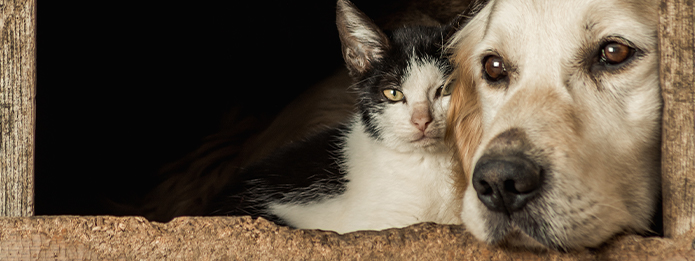Cambridge Rodent Removal: Can Rats Harm Your Pets?

Unfortunately, a rat problem isn’t just a problem for you. It’s a problem for your pets as well. If you have dogs or cats in the home, it becomes even more important you contact the rat control Cambridge professionals when you realize there’s a rat infestation or your pet could end up suffering.
Attack!
Most rats don’t feel the need to attack a dog or cat unless the rat itself feels attacked or somehow in danger. Rats will generally get into the home through a foundation crack they can squeeze through and since they are good climbers, getting inside will be a breeze. Once in there, they’ll look for food to eat, and that includes pet food. When your dog comes around the corner to find a rat eating his chow, it may not end well. The dog could begin to bark at the rat, which would intimidate the rat into becoming defensive. Instead of running away, the rat could attack.
When a rat attacks a dog or cat, the pet runs the risk of becoming wounded, but that’s not where the damage ends. Rats carry serious diseases that could cause danger and even death in a dog or cat. If your pet does get attacked by a rat, you should call the veterinarian immediately, as there will be certain measures that need to be taken to keep your pet healthy and help him recover from the rat attack.
Diseases
Most diseases are easily transmittable to dogs and cats. Some diseases you’ll need to worry about if you own pets and realize there are rats on your property include:
- Leptospirosis – Rats are common carriers of leptospirosis, which can be picked up by dogs that sniff, lick or ingest the rat’s urine. If the dog’s drinking water has come into contact with the rat, there’s a chance your dog could ingest the leptospirosis bacteria that way. This disease is deadly in dogs.
- Toxoplasmosis – Dogs and cats with weakened immune systems are most susceptible to toxoplasmosis, though cats that are even in good health can carry it and be affected by it. Toxoplasmosis is a parasite that gets ingested by dogs or cats that consume infected rodent meat. Symptoms might include difficulty breathing, cough, jaundice, fever, diarrhea, seizures or even death if it doesn’t get treated.
- Salmonella – Salmonella is spread through rat feces. If a dog or cat sniffs the feces, that pet runs the risk of contracting salmonella. Even living in the same environment as the rat can create a risk for dogs or cats to become contaminated. Salmonella doesn’t typically kill pets, but it can make them quite sick until it passes.
- Rat Bite Fever – As the name suggests, rat bite fever is contracted by dogs and cats through the bite of a rat. Pets can also be infected by sniffing or nibbling on a dead rat, as well as by ingesting something that came in contact with the rat’s feces. The effects of rat bite fever include swollen and painful joints, heart issues, weight loss, swelling in the neck, and other health issues in pets.
- Tularemia – Also known as rabbit fever, dogs can get tularemia by coming in contact with a dead rat or by drinking water that a rat has previously had contact with. Your dog might then experience a poor appetite, fever, inflamed eyes, enlarged lymph nodes, lethargy and draining abscesses.
Hiring Rat Control Cambridge Professionals Before Your Pets Are Harmed
As you can see, there are some serious issues that can sometimes lead to illness or death when your dogs and cats come into contact with rats and rat feces. If you’ve noticed rats or their droppings, it’s time to hire rat control Cambridge professionals to handle the problem before your pets become injured or sick.